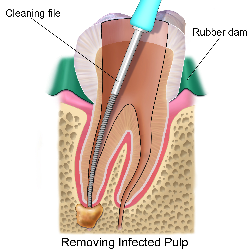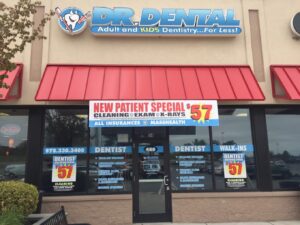Root Canal Procedures – Everything You Need to Know
 Root canal treatment is one of the most complex dental procedures, and much mystery surrounds this surprisingly common dental surgery. According to the American Association of Endodontists, more than 15 million root canals are performed every year in the United States. That’s well over 40,000 per day, every day!
Root canal treatment is one of the most complex dental procedures, and much mystery surrounds this surprisingly common dental surgery. According to the American Association of Endodontists, more than 15 million root canals are performed every year in the United States. That’s well over 40,000 per day, every day!
The procedure is relatively in theory, but can be difficult to perform and recover from. At Dr. Dental, we love educating our patients about dental procedures, and this page will explain what root canals are, why they’re sometimes necessary, how you can avoid them and much more.
Do I Need a Root Canal?
Just because you have a toothache doesn’t necessarily mean you have a root canal. However, tooth pain – especially severe pain, the kind that causes sleepless nights and sensitivity to certain foods and beverages – is a common sign of tooth decay
Pain from tooth decay has been described by some people as the worst discomfort they’ve ever experienced. The interior of a tooth contains nerve endings and pulp, which is protected by the hard, exterior enamel. The nerves and pulp are extremely susceptible to infection, and this part of the tooth is very sensitive. Because it has so many nerve receptors, the pain can be sharp, searing and sudden.
When a tooth’s enamel has worn away due to cavities, cracks or even multiple dental procedures, a root canal is sometimes the only viable treatment available. If you’re not sure you need a root canal, it’s best to consult with a Dr. Dental root canal dentist.
- The following dental habits contribute to tooth decay, so if any of the following behaviors describe your dental care regimen, you may require root canal treatment:
- Infrequent brushing
- Poor flossing habits
- Seldom use with antiseptic / antibacterial mouthwash
- Consume plenty of sugary, sticky substances
- Experience bleeding when flossing
If your dental care regimen is lacking in both effort and enthusiasm, and you’re unsure if a root canal is the ultimate solution for a particularly painful tooth, it may be time to visit Dr. Dental for an up-to-date assessment.
What Happens During Root Canal Treatment
Once your dentist has determined a root canal is required, the next step is to determine the severity of the damage. Not all root canals are created equal; some require targeted treatment, while others involve a complete revamp of the tooth’s interior region. For the most part, a root canal involves the following steps:
- Initial X-ray to verify need for root canal
- Anesthesia is administered to patient, if necessary (if tooth decay has deteriorated the nerve endings, no anesthesia is required)
- The area around the infected tooth is cleaned and isolated (usually with a rubber sheet) to prepare for procedure
- The dentist drills through the center of the tooth to access the infected pulp, dead nerve endings and other fragments and by-products of infection
- The tooth (now hollow inside) is thoroughly cleaned and sterilized to kill any remaining bacteriaOnce the tooth has been drilled and cleaned, it is sealed to prevent any foreign substances from re-entering
- Follow-up visits may require tooth restoration, depending on how severe the original root canal was
This is a general outline for a root canal procedure. The time, cost, recovery and restoration (if necessary) vary according to the patient, gravity of original infection, location of the root canal and other factors.
Need a Root Canal Dentist? Dr. Dental Provides Root Canal Treatment
Dr. Dental, the leading dental network in the northeast U.S., has performed hundreds of root canal procedures, with very high rates of customer satisfaction. Root canal cost is always a concern for patients. Expenses can quickly add up, due to the sophisticated nature of the care, including (but not limited to):
- The highly specialized nature of the procedure
- The tools, materials, cleansing agents and other items involved
- The possible reconstructive efforts in the post-root canal stage
According to the most recent estimates, the average cost for a root canal depends, in most part, to the type of tooth involved. Dividing the teeth up into three distinct regions – front, middle (bicuspid) and back (molars) – will provide a more accurate assessment of a single root canal procedure. Here is what a current study discovered, in terms of root canal cost per tooth:
· Front teeth – average cost around $750
· Bicuspid teeth – average cost almost $900
· Molar teeth – average cost in excess of $1,000
Dr. Dental works with each patient to determine root canal cost. Our flexible payment options, affordable rates and “everyone deserves a healthy smile” culture means everyone who walks into our doors for root canal therapy will be provided the best possible price.
Do dental Injections hurt?
Dental injections – also known as dental anesthesia – are required to perform complex dental procedures like root canals, tooth pulling, and related dental work.
One of the most common questions we receive from our patients is: do dental injections hurt? Let’s examine what dental injections consists of, and if they’re responsible for any associated pain.
Dental Injections 101
Ingredients
In order to prevent pain from the very start, most dental injections contain Lidocaine. This basic anesthetic helps numb the targeted area (gums, cheeks, etc.) in order to make patients feel as comfortable as possible.
There are other elements with dental injections, including drugs that narrow blood vessels (to extend numbness), increase numbing effectiveness, promote quick entry into the bloodstream, and more.
Duration
Most dental injections last anywhere from 2-5 hours.
Side effects
Dental injections can cause swelling, if the needle injects into a large enough blood vessel. Other minor side effects include general numbness outside the targeted area, which wears off in a few hours.
What about pain?
Because dental injections use numbing agents, there is no pain during the dental procedure. As the medicine wears off, patients can experience discomfort or minor pain, which is handled with over-the-counter medication (ibuprofen, Advil, etc.).
Don’t let dental injection anxiety prevent you from getting much-needed dental care. Our team at Dr. Dental makes sure you and your family will experience little to no pain for crucial dental procedures. Visit us today!
Root Canal Prevention
Avoiding tooth decay takes discipline and a consistent, daily regimen. Some people are more likely to require root canal therapy, but everyone should strive to have the healthiest teeth possible. A few things you can do to prevent the need for root canal treatment include:
· Brush your teeth at least twice per day, preferably three
· Use an antiseptic mouthwash to kill harmful bacteria
· Floss regularly
· Make regular visits to your dentist
· Realize your diet’s importance to overall tooth health (junk food + no brushing = eventual cavities)
That fourth item – visiting your dentist – might be the most underrated element of an effective tooth care program. Even the most dedicated people can slip up, and having a team of professional dentists to look after you is always a good idea. Dr. Dental’s root canal therapy is just one part of our complete, comprehensive dental services.
If you’re not sure if you need a root canal or have any other questions about your teeth, please call our main office today at (877) 776-9833. We have forty facilities to serve you, including our newest dental office in Lynn, Massachusetts. Thanks for visiting Dr. Dental, where you’ll find superior adult & kids dentistry, outstanding customer service and terrific value!
Related Articles
Things You Should Know After Getting a Root Canal
Root Canal 101: Everything You Need to Know











